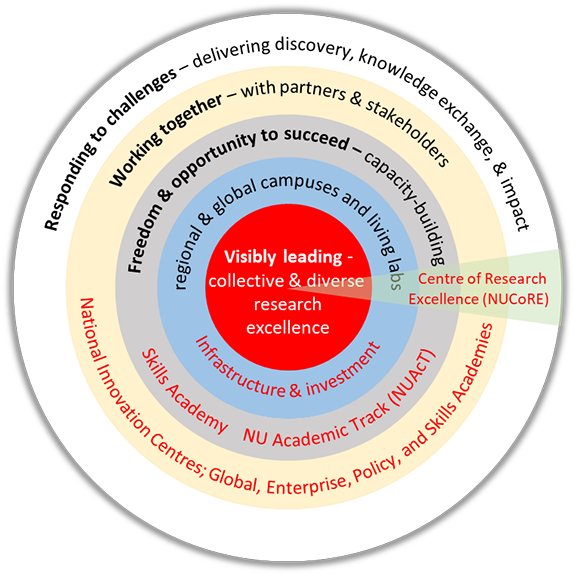Our Approach to REF 2021
We welcomed the reforms to REF that followed the Stern review. As captured in our code of practice, our approach has emphasised ‘collective excellence’.
Collective and diverse research excellence
This means:
- all eligible colleagues included in the return
- transparent declaration of circumstances that may have affected the outputs of each UoA
- commitment to not consider individual contributions to REF submission, in particular when reviewing individual performance or promotion
Our research environment
We welcome the chance in REF2021 to describe the institutional research environment. We also look at the environment within each of our UoAs.
We'll publish the Institutional Level Environment Statement when the REF assessment is complete. Some highlights include:

Vision and strategy
In 2018, we launched a new ‘Vision and Strategy’. It incorporates research for discovery and impact. This integrates with education for life, engagement and place and global strategies.
It sets our ambition for growth in research power (i.e. capacity) and intensity (i.e. resources) to 2025. It specifies priority actions to capitalise on our alignment with UK imperatives, notably:
- multidisciplinarity
- diversity
- capacity-building
- economic leverage
- internationalisation
Newcastle University has positioned itself at a scale that is:
- big enough to sustain all the disciplines needed to address major challenges
- small enough to work cohesively across the University and with partners
We drive our future priorities through this ‘one University, without walls’ philosophy.
Centres of Research Excellence (NUCoREs)
Our Newcastle University Centres of Research Excellence (NUCoREs) epitomise our 2018 Research Strategy.
They build upon existing research excellence, both individually and collectively. They help us to grow challenge-led and diverse research teams.
Academic Track (NUAcT)
Investments in people include the Newcastle University Academic Track (NUAcT) scheme. This is for early career researchers making the transition to independence.
It's attracted more than 1,400 applications from more than 70 countries. We are also especially proud of our work promoting career development for technologists.
Academies
Support for people includes innovative Newcastle University Academies in:
- Global Challenges
- Policy
- Skills
- Enterprise
Equality, diversity and inclusion
Equality, Diversity and Inclusivity runs through all our activities. It's recognised in many awards. These include a long-standing Athena Swan Silver status for the University.
Partnerships
We partner with many organisations, both internationally and in the North of England. They're notably embodied at the Helix campus, a £350m development in the city centre. It's a joint venture with Newcastle City Council and Legal & General.
We work with NHS organisations in the NIHR Academic Health Sciences Centre (Newcastle Health Innovation Partners). We have international campuses in Singapore and Malaysia.
Economic and societal impact
The economic and societal impact from our research is a major strength at Newcastle. We have ranked in the UK top 5 for:
- cultural engagement (museums and exhibitions)
- spin-out company formation (as part of the celebrated Northern Accelerator programme)
- collaborative research with partners
We have pioneered a model of National Innovation Centres (NICs). They provide expertise and the award-winning Catalyst venue to connect researchers with businesses. Currently, there are three NICs in:
Capital projects
In this REF cycle, we invested:
- £255m in capital projects involving research
- more than £100m in initiatives to support recruitment and development of research and impact
Highlights include:
- four new university buildings on the 24-acre Helix campus to support innovation, including in data science and engineering
- purchase from the NHS of the 29-acre Health Innovation Neighbourhood
- development of the Neptune Centre for Subsea & Offshore Engineering
- refurbishment of the Hatton Gallery, one of our university-owned museums and galleries
